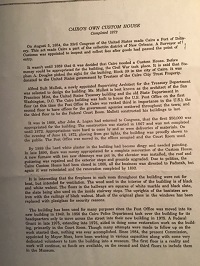
 Cairo's
Own Custom House
Cairo's
Own Custom HouseOn August 3, 1854, the 33rd Congress of the United States made Cairo a
Port of Delivery. This act made Cairo a part of the collection district of
New Orleans. A Surveyor of Customs was appointed to inspect and collect fees
after goods had passed the point of entry.
It wasn't until 1859 that
it was decided that Cairo needed a Custom House. Before money could be
appropriated for the building, the Civil War took place. It is said that
Stephen A. Douglas picked the sight for the building, Block 39 in the city
of Cairo. It was donated to the United States government by Trustees of the
Cairo City Trust Property.
Alfred Bult Mullett, a newly appointed
Supervising Architect for the Treasury Department was selected to design the
building. Mr. Mullett is best known as the architect of the San Francisco
Mint, the United States Treasury building and the old State Department in
Washington, D. C. The Cairo building was built to house the U.S. Post Office
on the first floor (at this time the Post Office in Cairo was ranked third
in importance in the U.S.); the second floor to have offices for the
government agencies scattered throughout the town; and the third floor to be
the Federal Court Room. Mullett constructed his buildings to last.
It
was in 1866, after John A. Logan had returned to Congress, that the first
$50,000 was appropriated for the building. The construction was started in
1867 and was not completed until 1872. Appropriations were hard to come by
and so were deliveries of materials. On the evening of June 16, 11872,
glowing from gas lights, the building was proudly shown to the public. The
Post Office was moved in, the offices occupied and the Court Room used.
By 1888 the hard white plaster in the building had become dingy and
needed painting. In late 1890, there was money appropriated for a complete
renovation of the Custom House. A new furnace with two new chimneys was put
in, the elevator was installed, the roof and guttering was repaired and the
exterior steps and grounds upgraded. Due to politics, the Cairo Custom House
had been closed in 1885, all the business was directed to Paducah, but again
it was reinstated and the renovation completed by 1892.
It is
interesting that the fireplaces in each room throughout the building were
not for heat, but intended for ventilation. The wood used in the interior of
the building is of black and white walnut. The floors in the hallways are
squares of white marble and black slate, the slate being also used on the
inside stairway steps. The uprights of the banisters are iron with the
railings of black walnut. Much of the original glass in the windows has been
replaced with plexiglass for security reasons.
The building has been
used for many purposes since the Pot Office was moved into its new building
in 1942. In 1956 the Cairo Police Department took over the building for its
headquarters only to move across the street into their new building in 1975.
A Federal Grant in late 1975, extending into 1976, aided in doing some
restoration work on the building, primarily in the Court Room. Though many
attempts were made to follow up on the work started then, nothing was ever
accomplished. Since 1984, the presnt Commission, appointed by Mayor Moss,
have been working in various capacities along with some very dedicated
volunteers to turn the building into a museum. The first floor is a reality
and work will continue, as funds are available, on the second and third
floors to include them in the Museum.
Contributed 12 & 27 Aug 2019, by Deborah McGee Cox, as a part of the McGee Collection. "My father, William Julius McGee, was a docent at the Custom House for several years after retirement."
| Cape Girardeau MO |
Union | |
 |
Pulaski | |
| Scott MO | Mississippi MO | Ballard KY |


